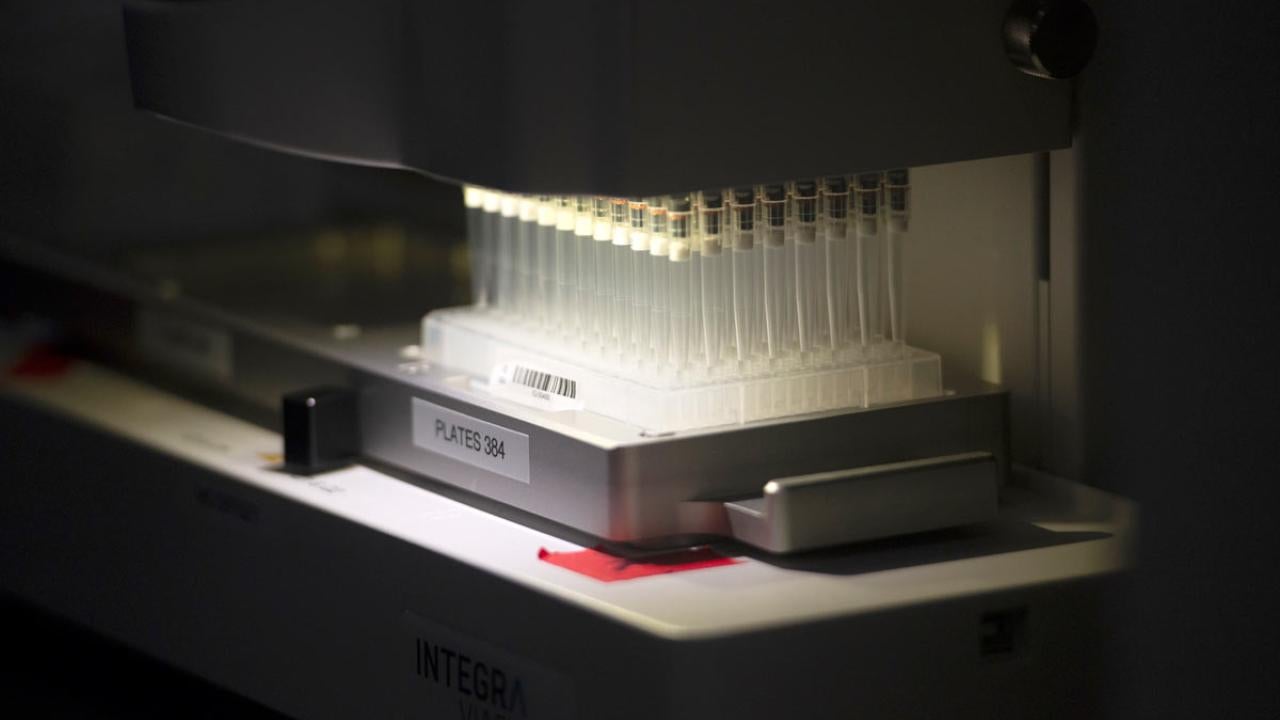Through its free community COVID-19 test operations, Healthy Davis Together and the UC Davis Genome Center identified the first known case of the B.1.1.7 variant of the virus SARS-CoV-2 in the Sacramento region.
COVID-19 ROUNDUP
- UC Davis LIVE: Coronavirus Mutations and Variants (11 a.m. Thursday, Feb. 11)
- Eligibility at the Davis campus vaccine clinicexpands Wednesday (Feb. 10) to employees of any age with occupational risk.
- From UCOP: Vaccination progress and policy
Scientists at the Genome Center began genotyping positive samples of the virus in January as part of their COVID-19 screening efforts to monitor for variants of concern. Researchers have found evidence that the B.1.1.7 variant virus is more contagious and predict that it will spread rapidly in the United States, doubling in relative frequency approximately every 10 days. So far, studies suggest that antibodies generated through vaccination with currently authorized vaccines recognize these variants.
“Even though Davis has an overall low rate of COVID-19 positive tests, it has always been a matter of when, not if, we would see new variants in the area,” said David Coil, project director of environmental monitoring for Healthy Davis Together and project scientist at the Genome Center. “A variant that spreads more easily, such as B.1.1.7 (which originally emerged and spread in the U.K.), will eventually displace other variants.
“The Genome Center added genotyping of positive samples to its testing protocol to monitor for any variants of concern so we can quickly alert the community and double down on community efforts to prevent spread.”
‘It is not surprising’
Yolo County Public Health Officer Aimee Sisson said: “Given that the B.1.1.7 variant has already been found in Southern California and the Bay Area, it is not surprising that it has now been detected in Yolo County.
“However, detecting this more infectious variant locally is a reminder that even though case rates are declining in Yolo County, we must maintain our vigilance and continue using protective measures against coronavirus. Masking, distancing and avoiding indoor gatherings are as important as ever, and will continue to be critical until most of the population has immunity. We cannot let down our guard.”
The person who tested positive for the B.1.1.7 variant has already been notified and is under isolation, and contact tracing efforts began immediately upon notification. This individual is an adult and may have acquired the variant through travel outside of the community. The B.1.1.7 variant, thought to have emerged in the United Kingdom in September 2020, has now been detected in 33 states, including California, Florida, Nevada, New York and Texas.
The first detection in the U.S. occurred in Colorado on Dec. 29. Two days later researchers at UC San Diego reported a case in San Diego. Scientists hypothesize that the variant has been spreading rapidly in the United States since late November.
Genotyping process
Scientists use the same instrument used to screen COVID-19 test samples for genotyping virus samples. The IntelliQube PCR System, designed as a genotyping instrument by LGC Biosearch Technologies, permits rapid genotyping of all positive samples, and in its first week of use revealed a virus sample with two of the mutations associated with B.1.1.7.
Whole genome sequencing of the sample was done in the laboratory of UC Davis Professor Samuel L. Díaz-Muñoz to confirm the identity of the variant as B.1.1.7. Díaz-Muñoz, who studies viral evolution, noted that variants emerge during viral replication in infected individuals, and that widespread transmission of the virus contributes to the emergence of new variants.
“These variants shouldn’t be a sign that we should give up, but rather be a wake-up call” that people should take control measures seriously, he said.
Genotyping technology can also be used to screen positive samples for other significant variants in the future, including variants with the E484K mutation, which has been associated in some cases with reduced neutralization of the virus by antibodies and present in variants first identified in South Africa (B.1.351) and Brazil (P.1).
“Although genotyping, unlike whole genome sequencing, will not discover new viral mutations, it is quicker and less expensive than sequencing and therefore more practical for screening large numbers of samples” said Richard Michelmore, director of the Genome Center. “All positive samples identified by the testing lab are now genotyped immediately for all currently known variants of concern. Samples of interest will also be sequenced.”
Reducing the spread
Healthy Davis Together and Yolo County have been collaborating throughout the COVID-19 pandemic on COVID-19 testing, vaccination and education to help reduce the spread of this virus among those who live or work in the Davis community.
Now, more than ever, people must continue to follow guidance to prevent the spread of COVID-19 and all its variants, including:
- Wearing a mask/face covering, making sure it fits properly
- Keeping physical distance, at least 6 feet apart and more if possible
- Practicing good hand hygiene
- Getting tested at least weekly for COVID-19, even if you are asymptomatic
- Avoiding crowds and indoor gatherings
- Staying home if you feel sick
- Getting vaccinated when it is available to you
More information
- B.1.1.7 and other variants of concern (Centers for Disease Control and Prevention)
- Free COVID-19 testing provided by Healthy Davis Together and by Yolo County
- Yolo County COVID-19 response
Healthy Davis Together is a joint project between UC Davis and the city of Davis to prevent the spread of COVID-19 in our community and facilitate a coordinated and gradual return to regular city activities and student life. Comments and questions are welcome by email.
The UC Davis Genome Center testing lab operates under a CLIA-certified extension of the UC Davis Student Health and Counseling Services CLIA license.
Media Resources
Andy Fell, News and Media Relations, 530-752-4533, ahfell@ucdavis.edu
Melissa Blouin, News and Media Relations, 530-752-2542, mlblouin@ucdavis.edu
